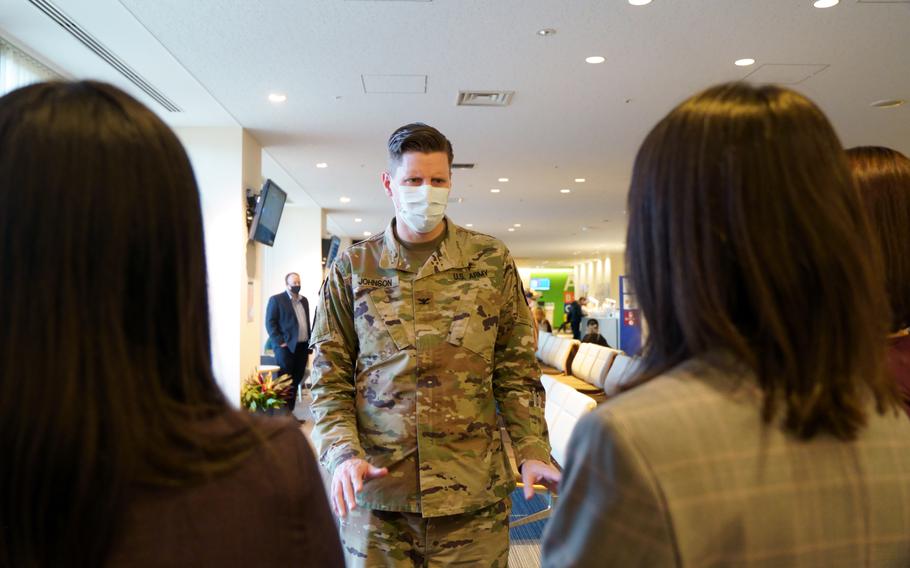
Intepreters staffing a U.S. civilian help desk at Zama General Hospital get a visit from Col. Jeremy Johnson, medical department commander for U.S. Army Japan, Feb. 7, 2024. (Akifumi Ishikawa/Stars and Stripes)
CAMP ZAMA, Japan — American military bases across Japan are likely to copy an Army program that employs interpreters to help U.S. civilians obtain off-post health care, according to the Army’s top general in the country.
“I expect it to be mimicked,” U.S. Army Japan commander Maj. Gen. David Womack said Wednesday of Zama’s Civilian Healthcare Navigator program.
Since October, the program has employed bilingual Japanese at nearby Zama General Hospital to guide Defense Department civilians and their families as they receive treatment.
Many civilians weren’t happy when the Defense Health Agency — under a congressional mandate that took effect Jan. 1, 2023 — began limiting chronic care at base hospitals to Tricare Prime beneficiaries. The plan serves only active-duty troops, their families and eligible retirees.
DOD civilians were urged to seek care from Japanese providers, which were not immediately apprised to a sudden influx of Americans needing appointments. After a slew of complaints, DHA soon reversed itself and said civilians could seek on-base treatment again, on a space-available basis, for chronic health conditions like diabetes or high-blood pressure.
Those same-day appointments, however, can be few and far between, forcing many off base.
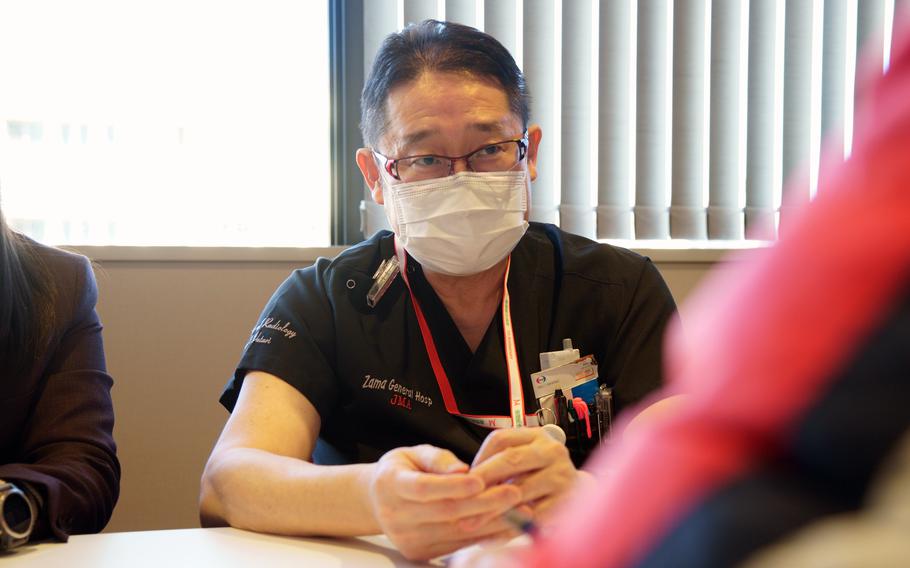
Dr. Jun Watari, chief executive of Zama General Hospital, discusses U.S. Army Japan's Civilian Healthcare Navigator program, Feb. 7, 2024. (Akifumi Ishikawa/Stars and Stripes)
Large civilian workforce
The command established a relationship with Zama General to help its civilians avoid long commutes to international facilities in Tokyo, Col. Jeremy Johnson, medical department commander for U.S. Army Japan, said Wednesday at the base.
In addition to 2,500 soldiers and their dependents, the garrison’s population includes 2,100 DOD civilians and their families, he said.
Johnson worked with Zama General’s chief executive, Dr. Jun Watari, to create a help desk staffed by Japanese interpreters who can help Americans book appointments.
The linguists also accompany patients as they interact with doctors and other hospital staff and pay for treatment. Zama General does not accept U.S. medical insurance, so patients must pay up front.
The program has already helped more than 200 patients, including civilians stationed at nearby Naval Air Facility Atsugi, and has expanded from two to four translators with plans to hire another, Johnson said.
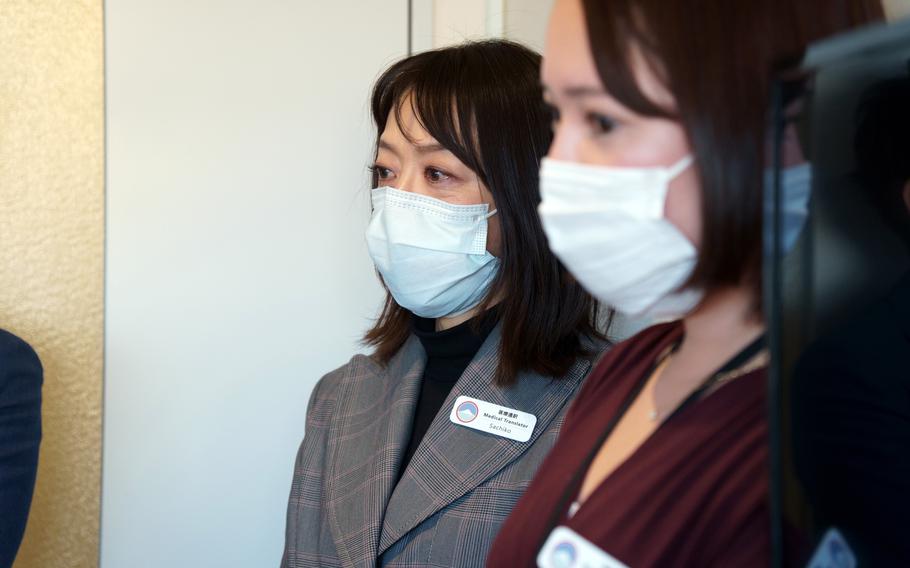
Sachiko Fukada, left, and Nozomi Akiyama are among the linguists who help American civilian patients obtain care at Zama General Hospital near Camp Zama, Japan. (Akifumi Ishikawa/Stars and Stripes)
‘Right to care’
The program is important for the command’s efforts to recruit and retain its civilian workforce, Womack said.
“People vote with their feet,” he said. “Our people have a right to care, and we are going to get it for them, period.”
Some DOD agency managers in Japan complained last year that the new health care policy caused some employees to leave Japan and prospective hires to decline offers.
Those workers include Randi Wilson, a DOD analyst and health care advocate who worked at Yokota Air Base in western Tokyo.
“I’m an analyst in Germany now,” she said in a text message Friday. “I left early because of the medical situation actually.”
Wilson said this new Army effort is a step in the right direction toward restoring ready access to health care for DOD civilians, contractors and their families in Japan, but it’s not a cure-all.
“It’s a fantastic idea that I believe could lessen the burden on civilian patients seeking medical care,” she said. “But there are still flaws and potential for harm.”
It all boils down to the same root causes, Wilson said: “Japanese facilities can deny care, and Japanese standards of medicine and medication are very different from U.S. ones.”
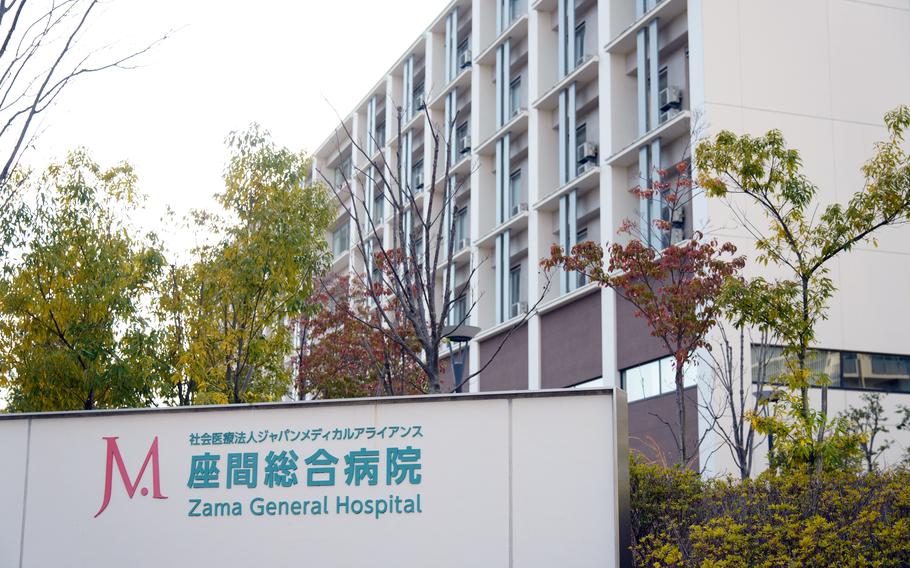
Zama General Hospital, near the home of U.S. Army Japan, provides a wide range of care, from cardiology to joint replacements, but doesn’t offer annual physicals or mammograms. (Akifumi Ishikawa/Stars and Stripes)
Physicals and mammograms
Zama General, which caters to the city’s 120,000 residents, employs 35 doctors, and is open 24 hours a day, seven days a week. It offers care ranging from cardiology and joint replacement, but it doesn’t provide some basic services like annual physicals or mammograms.
The Army has been working with another facility, Ebina Hospital, along with clinics at Yokota and Yokosuka Naval Base, to provide civilian mammograms on a space-available basis, Johnson said.
Before the navigator program, language had been a barrier for nurses, receptionists and other staff interacting with Americans, Watari said during a tour of Zama General on Wednesday.
They will refer patients needing specialized care to other Japanese hospitals, he said through an interpreter.
The navigator program should be established at other Japanese hospitals near U.S. bases, Watari added.
“Patients who speak English are comfortable with the interpreters,” he said.
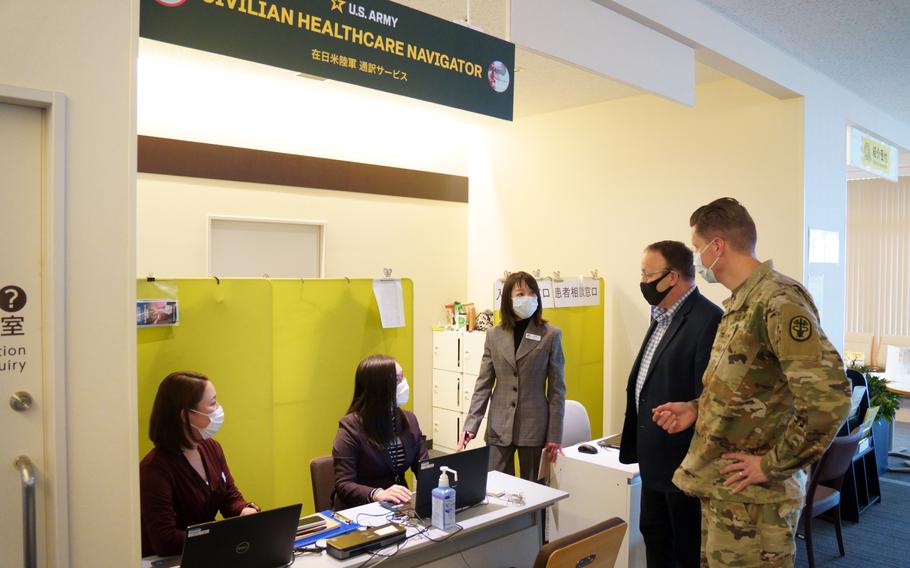
Intepreters staffing a U.S. civilian help desk at Zama General Hospital get a visit from Col. Jeremy Johnson, medical department commander for U.S. Army Japan, Feb. 7, 2024. (Akifumi Ishikawa/Stars and Stripes)
Patient testimonials
The Army put Stars and Stripes in touch with several recent Zama General patients to speak about the health care navigator program on Wednesday.
Suzy Venn, an elementary school teacher at Sagamihara Housing Area, has used the translators for issues ranging from a cyst to an eye infection.
“You check in and they greet you and you are with them the whole time,” she said.
Space-available appointments are difficult to find at the base hospital, and teachers usually have little free time during the day, anyway, Venn said.
The interpreters also helped Gary Bolos, the civilian deputy operations officer for U.S. Army Japan, during appointments ahead of knee replacement surgery next month.
The retired Army explosive ordnance disposal officer can use on-base clinics thanks to his Tricare coverage but said he chose Zama General for the surgery after hearing about the interpreters.
“I think we will need more (interpreters) as the word gets out and civilians start using Zama General,” he said.